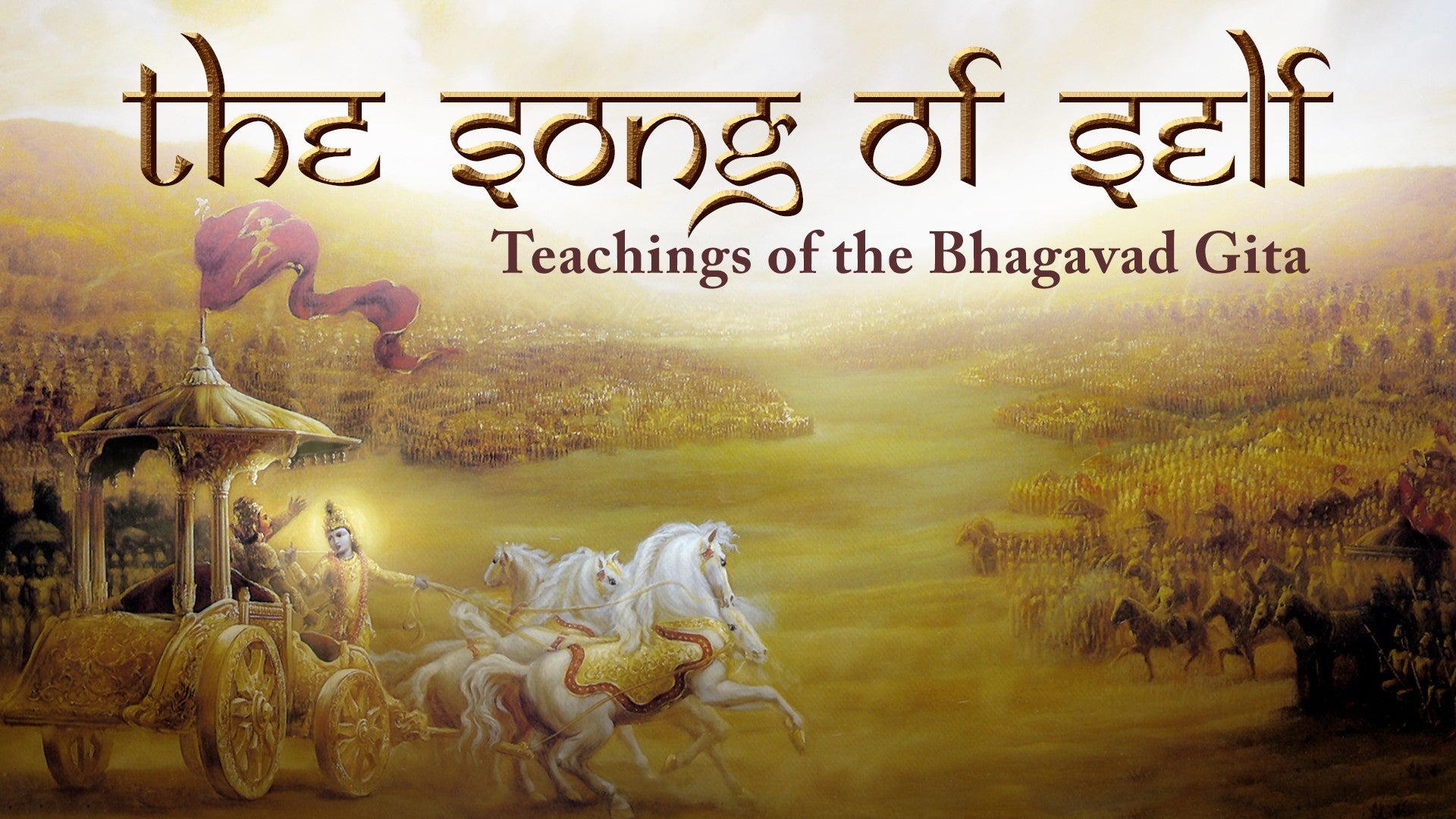Description
About This Video
Transcript
Read Full Transcript
Welcome back. We'll continue now. You may notice that one of our group, Julia, is not here right now. She's actually gone to teach a class, but she'll join us again soon. And what she's going to miss now is this section. These next three verses are actually quite controversial verses. Maybe one might say dangerous verses. So we're going to look at 19, 20, and 21 together. And in the 19th verse, Krishna says, YA INAM VEETI HAN TARAM YASCHEINAM NYATI HATAM UBHAO TONA VEETI HANI TONAYAM HANJI NAHANI TAY The 20th. And the 21st. VEETA VEETI HANAYAM YA INAM UBHAO TAYAM UBHAO TAYAM UBHAO TAYAM UBHAO TAYAM So in the 19th verse, Krishna says, YA INAM VEETI HAN TARAM YASCHEINAM NYATI HATAM So one who thinks that this hantara is the killer or hatam is killed, ubhao tau, both of these positions, navijjani taha, they're not seeing it very clearly, na amhantin hanyati, this does not kill nor is it killed. So Krishna's now introduced this, I am this. And the idea that this, what he's talking about now is that thing which is unfathomable and imperishable and indestructible. And he remember he said that it's unfathomable, he can't really talk about it very easily. So Krishna in his next three verses, he just refers to it as this. And he says one who thinks that this is the killer or the killed, both of these views of it, they're not correct. Then in the 20th verse he says, this najayate mriyateva karachit, that at any time is this born or die. It's never born, it never dies. This, this unfathomable, almost indescribable, imperishable essence, it's never born, it never dies. Na ayam bhutva bhavitava na bhu yaha, nor is there any question that once it has come into existence, it will cease to exist or not cycle through existence again. This is ajo, aja, nitya, shashvata, ayam puranaha. So aja means it is unborn. Nitya, it's eternal. Shashvata, it's everlasting. Ayam this puranaha, it's ancient, it's been here since way back. Na hanyate hanyamani sharire, it is not killed in the instance that the body is killed. So here in the 20th, the idea that the essence, this, this underlying essence of which the soul or the spirit is constituted, we might say, isn't born, it doesn't die. And there's no question that once it's come about, it's not going to continue to be. It's unborn, it's eternal, it's everlasting, it's ancient, and when the body dies, it doesn't die. Then the 21st he says, veda avinashinam nityam yaha eenam ajim avyayam katamsa purasya fparta kam gÄ쳌rty dhihanti kam. So he says, one yaha veda, one who knows that this is ajam, is unborn, avyayam, is indestructible, is avinashinam, cannot be destroyed. Katamsa purasya fparta, how could that person katayati, how could that person cause to kill kam hanti, how could that person kill? So we can probably say, whoa, very dangerous verses, yeah? So there have been instances in relatively recent human history where certain people or groups have used these verses to justify brutality, saying, oh, well, we're not doing anything, it's just, you know, we're just killing the body, we're not doing anything to the soul. I think that's not just dangerous, but it's a very irresponsible misreading because it's not really taking into account the larger context even though the context of the story is on the battlefield. We saw from the beginning this battlefield is really signposted as being the internal realm. So I think it's important to remember that that is the context, it's the internal battle. However, with these verses, Krishna is making it clear that he's talking about something that is very hard to define. So when we come to this verse and we find it a little bit hard to understand, I think we have to take that as an invitation to actually probe deeper, to look into it more closely and to reflect or contemplate on it more patiently. But I think the idea here is that this is the stuff of oneness. This is what everything is at its essence. So Krishna says, how can one who knows this as undying, as inviolable, as indestructible, how can such a person kill or cause to be killed? So the idea is that once we really understand the underlying oneness, and it's important to recognize, once we really understand it, when we have the experience that we look out on the world and we just see a field of shimmering unity, then how will we kill or cause to be killed? Because we will see everything at its essence. And it's the idea that once we're actually established in that clarity of vision and awareness, our actions will not be at all destructive. So the idea of justifying violence with this verse is really against the idea of what the verse, I think, is suggesting, which is that once you come to truly understand reality, you will no longer commit acts which inflict suffering. There's the idea in yoga that when you become truly established in that integrated state is that your actions naturally and easily become so fine-tuned, so skillful, that you almost naturally act in a way that is conducive to sustained and deepening harmony. In the yoga sutra, Patanjali talks about this when he says that the kind of advanced practitioner attained this state of integration, samadhi, called dharma-megha-samadhi. Megha means a cloud. It's the idea that when one becomes very, very well established in this state of integration, naturally one's actions then support sustained integration. And so Patanjali says like, for example, let's say we're out walking and it's the very early morning, it's still dark. Let's say we walk through a cobweb and we're wearing trousers. We might not even notice it. But if the cobweb was at a level, let's say it was on a branch, from a tree is on the path we were walking along, and we came into contact with the cobweb just in front of our eye, what would happen? We wouldn't have the thought, oh, here is a cobweb in front of my eye. Let me close my eye now. We will just blink automatically. It's like a reflex action. And there's the idea that once we become so integrated and our awareness is so steady in that equipoised place, there's the idea that all of our actions will reflexively support that sustained well-being. Because we'll be established in harmony. We'll be established in unity. And so our actions will help deepen and extend that unity. So I mention this because it could be easy to kind of pull these verses out of context. But in the yogic system we're actually cultivating harmony. So other things that are a little bit interesting to notice here is the idea in the 20th that it's not born, nor does it die. It's actually everlasting. So if we're identified, if we've come to recognize ourselves as something that is everlasting, would we ever feel tempted to drop into a kind of aggressive state? Why do people kill or try to subjugate others? I would suggest that generally it's because they're afraid that if as human beings we try to exploit others it's because we're trying to cling onto things or we're feeling a sense of lack somehow. But if we see that actually everything is already full, how would we possibly embark on an exploitative action? So these verses certainly you can abuse them or you could use them to justify action which would be a yogic, against yoga let's say. But for me as I've considered them over the years I think more there's the idea that Krishna's emphasizing here that when you really know unity you will never fall into fearful action. You'll never fall into aggression. And to me that's the underlying key instruction here is that cultivate that state of harmony integration in which you don't feel aggression and if you do it's actually an indication that you need to make some effort to come back to a more centered place where you understand that your relationship to the other is also a relationship to yourself because at the essence everything that we're interacting with is also part of us because we all exist in the same sphere of consciousness.
The Song of Self: Bhagavad Gita: Chapter 2
Comments
You need to be a subscriber to post a comment.
Please Log In or Create an Account to start your free trial.











